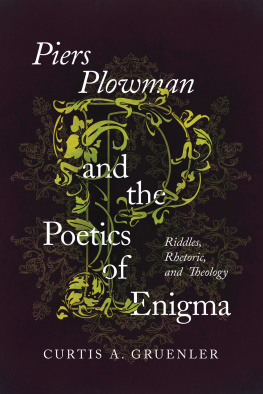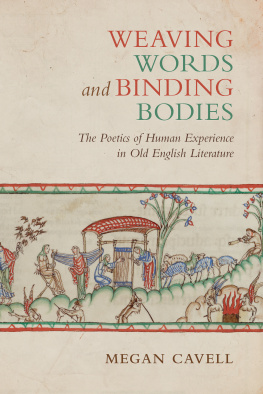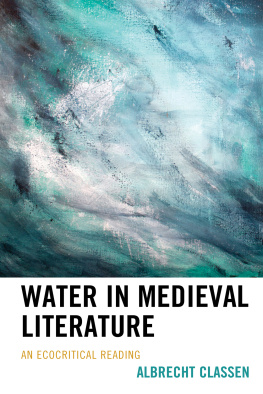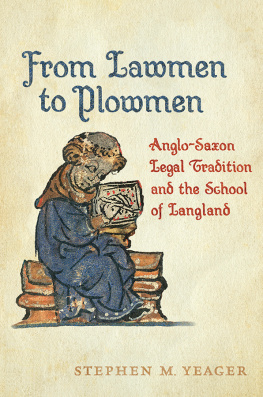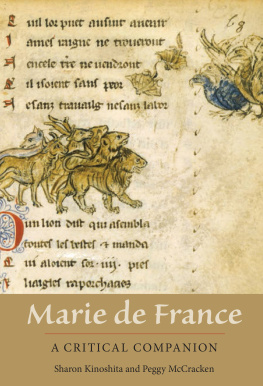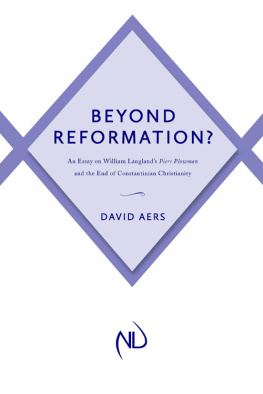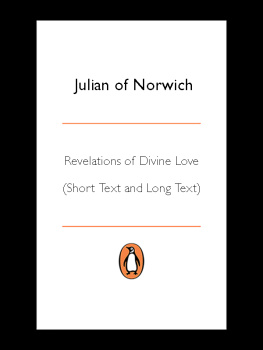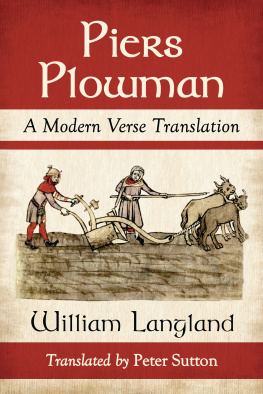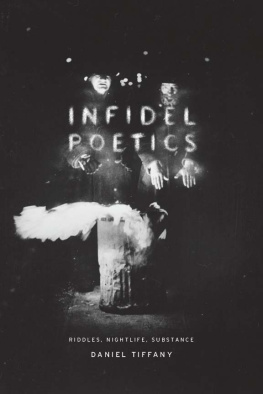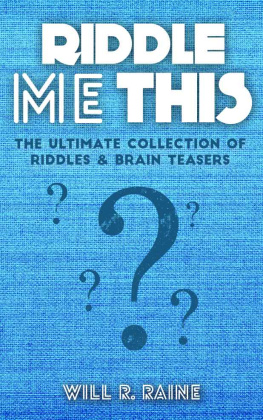
Piers Plowman and the Poetics of Enigma
Piers Plowman and the Poetics of Enigma
Riddles, Rhetoric, and Theology
CURTIS A. GRUENLER
University of Notre Dame Press
Notre Dame, Indiana
University of Notre Dame Press
Notre Dame, Indiana 46556
www.undpress.nd.edu
All Rights Reserved
Copyright 2017 by University of Notre Dame
Published in the United States of America
Library of Congress Cataloging-in-Publication Data
Names: Gruenler, Curtis A., 1964 author.
Title: Piers Plowman and the poetics of enigma : riddles, rhetoric, and theology / Curtis A. Gruenler.
Description: Notre Dame : University of Notre Dame Press, 2017. | Includes bibliographical references and index.
Identifiers: LCCN 2016053425 (print) | LCCN 2017005369 (ebook) |
ISBN 9780268101626 (hardback) | ISBN 0268101620 (hardcover) |
ISBN 9780268101640 (pdf) | ISBN 9780268101657 (epub)
Subjects: LCSH: Langland, William, 1330?-1400? Piers Plowman. | Ambiguity in literature. | Riddles in literature. | Langland, William, 1330?1400?Aesthetics. | Poetics--History-To 1500. | Aesthetics, Medieval. |
BISAC: LITERARY CRITICISM / Poetry. | LITERARY CRITICISM / Renaissance. | LITERARY CRITICISM / Medieval.
Classification: LCC PR2017.A53 G78 2017 (print) | LCC PR2017.A53 (ebook) | DDC 821/.1dc23
LC record available at https://lccn.loc.gov/2016053425
ISBN 9780268101657
This paper meets the requirements of
ANSI/NISO Z39.48-1992 (Permanence of Paper).
This e-Book was converted from the original source file by a third-party vendor. Readers who notice any formatting, textual, or readability issues are encouraged to contact the publisher at .
For Pauline and Eric
CONTENTS
This book tries to do two things, either of which might have been sufficiently ambitious on its own. First, it makes a broad case, based on the three fields of meaning of the Latin word aenigma in the Middle Agesriddles, rhetoric, and theologythat a poetics of enigma was recognized across the medieval period and provides an important way of understanding, in their own terms, many of the most ambitious medieval literary works. Second, it seeks, in a more focused and sustained way, to unlock perhaps the most enigmatic medieval text, William Langlands Piers Plowman. This remarkable poem provides the most comprehensive and self-aware guide to the medieval poetics of enigma. While such a poetics was widely practiced and the rationale for it was expressed in many places, in most cases it is less explicit and is visible only a facet at a time. Piers Plowman plays across the whole range of the potential that medieval authors found in the enigmatic, and seeing this potential from other sources illuminates what this poem is up to and how it shaped English literature to come. As a third, bonus goal, then, I also suggest that the medieval poetics of enigma is a major root of what has come, in the modern period, to be called literature.
One of the virtues of enigmatic texts is that they appeal to beginners while occasioning new insights for those already familiar with a subject. I hope that will be true here too.
Note that the spelling of Middle English texts has been modernized throughout (except in titles of modern publications) to avoid obsolete characters. The spelling of both Middle English and Latin has been regularized to follow modern orthography of i and u as vowels and j and v as consonants. Curly brackets indicate emendations of texts made by editors of the editions cited or, in the case of translations, the original language; square brackets indicate my own glosses of difficult words. Translations are my own unless otherwise indicated. Unless otherwise noted, Piers Plowman citations are to Piers Plowman: A Parallel-Text Edition of the A, B, C and Z Versions, edited by A. V. C. Schmidt, 2nd ed., 2 vols. (Kalamazoo, MI: Medieval Institute Publications, 2011), by version, passus, and line number(s).
* * *
This project began many years ago with my dissertation research, and I am grateful for help from many people. The cochairs of my dissertation committee, Henry Ansgar Kelly and V. A. Kolve, provided essential teaching and guidance, marvelously different and each the most excellent one could want. To my other committee member, Patrick Geary, I owe in particular the image of the project as resting upon a three-legged stool, which has been in my mind ever since. UCLA provided a stimulating and supportive scholarly community. I want to express particular thanks to some other members of the English faculty: Michael J. B. Allen, Lynn Batten, Edward I. Condren, Lowell Gallagher, Arthur L. Little, Donka Minkova, Joseph F. Nagy, Jonathan F. S. Post, Allen Roper, Paul D. Sheats, Debora K. Shuger, George Tennyson, and Robert N. Watson. Thanks also to the UCLA Center for Medieval and Renaissance Studies for the opportunities it provided and to staff member Blair Sullivan for her collegiality. I also thank my undergraduate adviser from Stanford, Martin Evans, for showing me what literary scholarship could do and for sending me to UCLA, the single best piece of advice Ive ever gotten.
Graduate student friends at UCLA gave me an experience of intellectual friendship that I hope shines through in this books ideal of community, among them Terri Bays, Thad Bower, Jessica Brantley, Paul Bryant, John Dalton, Greg Jackson, Martin Kevorkian, Sarah McNamer, Stanley Orr, Tanya Paull, Catherine Sanok, and Dana Cairns Watson.
Many other scholars have helped and encouraged me, not least through their models of scholarship: James Alison, Ann Astell, Sherwood Belangia, Peter Brown, Christopher Cannon, Cristina Maria Cervone, Ren Girard, Robert Hamerton-Kelly, David Lyle Jeffrey, Kerilyn Harkaway Krieger, Traugott Lawler, Ryan McDermott, Anne Middleton, Derek Pearsall, James Simpson, Emily Steiner, Sarah Tolmie, and Lawrence Warner. No doubt there are other important conversations I am forgetting.
One little story distills how this project has been intertwined with relationships. One day, soon after coming up with enigma as a focus, I was walking with my friend John Dalton through UCLAs Rolfe Hall and asked him where he would look for Middle English riddles. That evening I found in my mailbox the issue of Speculum with Andrew Galloways article The Rhetoric of Riddling in Late-Medieval England. I first thought I would need to find another topic, then realized that his article was just what I needed to move forwardsomething I am glad to have been able to acknowledge to him in person already.
Hope College has been a wonderful place to work and to take a long time to write a book. For patient, consistent support both practical and personal, I thank my provosts, Jacob E. Nyenhuis, James Boelkins, and Richard Ray; my deans, William Reynolds and Patrice Rankine; and my department chairpersons, Peter Schakel, David Klooster, and Ernest Cole. Colleagues in English and other departments have also given many kinds of support and helpful responses to my work, including Susanna Childress Banner, Steve Bouma-Prediger, Rhoda Burton, John Cox, David Cunningham, Natalie Dykstra, Janis Gibbs, Stephen Hemenway, Charles Huttar, Rob Kenagy, James Kennedy, Julie Kipp, Joseph LaPorte, Marla Lunderberg, Steve Maiullo, Jesus Montao, Jared Ortiz, William Pannapacker, Jack Ridl, Heather Sellers, Caroline Simon, Jennifer Young Tait, Beth Trembley, Jeff Tyler, Kathleen Verduin, Leslie Werkman, and Courtney Werner. Many thanks also to the English departments office managers, Myra Kohsel and Sarah Baar, and the staff of Van Wylen Library.
Next page
